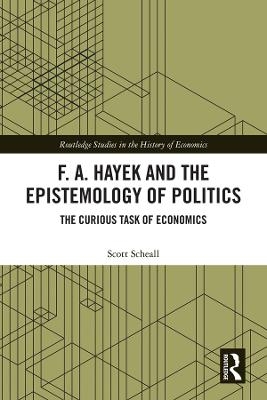
F. A. Hayek and the Epistemology of Politics
Routledge (Verlag)
978-1-138-28995-6 (ISBN)
F. A. Hayek and the Epistemology of Politics is an exploration of an important problem that has largely been ignored heretofore: the problem of policymaker ignorance and the consequences of limited political knowledge. Scott Scheall explores the significance of the fact that the possibilities for effective political action are constrained by policymakers’ epistemic limitations. The book offers an explanation for why policymaking often fails and why constituents, whatever their political affiliations, are so often disappointed with political leaders.
In this philosophical examination of his work, Hayek’s ideas are not merely discussed, analyzed, and contextualized, but extended; the book both draws and defends previously unrecognized implications from the Hayekian canon.
The book will be of interest to scholars of the works of F. A. Hayek and his intellectual adversaries, to policymakers, and to those of all political, philosophical, and social-scientific persuasions.
Scott Scheall is Assistant Professor and Director of Graduate Studies in the Faculty of Social Science in Arizona State University’s College of Integrative Sciences and Arts, as well as Project Director for the History of Economic Thought in Arizona State University’s Center for the Study of Economic Liberty. He has published extensively on topics related to the history and philosophy of the Austrian School of economics. Scott is co-host of Smith and Marx Walk into a Bar: A History of Economics Podcast.
Dedication, About the Author, Preface, Acknowledgements, Introduction, Part One, The Problem of Policymaker Ignorance, Chapter One, Policymaker Ignorance: The First Problem of Politics and Political Inquiry, Some Terminological Clarifications, The Logically Ancillary Nature of the Problem of Policymaker Incentives, The Logical Priority of the Epistemic, More about Epistemic Burdens, The Introspective Argument for the Logical Priority of the Epistemic, The Argument for the Logical Priority of the Epistemic from Ought Implies Can and Similar Principles, The Problematic Nature of Political Decision-Making in Light of the Priority of the Epistemic, Policymaker Ignorance and Constituent Disappointment, A Taxonomy of Ignorant Policymakers, Reflection and Foreshadow, Chapter Two, Beyond the Socialist Oasis: Hayek’s Extensions of Mises’ Calculation Argument, The Insurmountable Epistemic Burden of the Administrator of a Pure and Isolated Socialist Oasis, Hayek’s Epistemology – A First Pass, Explanation, Prediction, and Control of Complex Phenomena, The Epistemic Burdens of Socialist Administrators in Other Contexts, The “Mathematical Solution”: Not a Solution, Abrogating Economic Freedom to Facilitate Solution of the Calculation Problem, The Epistemic Burdens of the Central Planner under Market Socialism, The Epistemic Burden of Achieving Consensus concerning a Central Plan, The Epistemic Burdens of Countercyclical Economic Policymaking and Keynesian Demand Management, The Role of Ignorance in Hayek’s Early Theory of Industrial Fluctuations, Hayek’s Epistemic Theory of Industrial Fluctuations, The Generality of the Reasoning Underlying the Austrians’ Political-Epistemological Approach, Reflection and Foreshadow, Chapter Three, Liberalism and the Problem of Policymaker Ignorance, The Epistemic Burdens of Realizing an Effective Liberal Order: The Problem of the Epistemic Requirements of Liberal Transitions, The Artificiality of the Assumption of the Committed Liberalizer, Hayek’s Failure to See the Problem of the Epistemic Requirements of Liberal Transitions, Political Epistemology > “Epistemic Institutionalism”, Robust Political Economy: Not a Solution, The Epistemic Burden of Policymaking within Liberal Environments, The Epistemic Burden of Policy Inaction, Reflection and Foreshadow, Part Two, Hayekian Political Epistemology, Chapter Four The Epistemological Aspects of Hayekian Political Epistemology, Hayek versus Mises on Matters Epistemological, Part One Hayek as Theoretical Psychologist and Epistemological Naturalist, Some Historical Background, Hayek’s Conception of Knowledge, Epistemological Normativism vs. Epistemological Naturalism, Association as the Principle that Explains the Complex Phenomena of Mental Life, Hayekian A Priori, Knowledge: Pre-Sensory Linkages, Hayek versus Mises on Matters Epistemological, Part Two, Hayek’s Radical Empiricism, Epistemic Justification and Hayek’s Non-Standard Conception of Knowledge, Subjective Data and Objective Data, Hayekian Political Epistemology, Reflection and Foreshadow, Chapter Five Political Order and Disorder as Epistemic Phenomena, Knowledge, Planning, Social Order, and Epistemic Mechanisms, Further Epistemic Requirements of Social Order, How Prices Tell You “What to Do”, How Reputation Signals Tell Scientists (and Others) “What to Do”, Political Order and Disorder, Reflection and Foreshadow, Chapter Six Hayekian Political Epistemology as a Science of the Limits of Deliberate Political Action, Hayek versus Keynes Yet Again, A General Schema for Empirical Political Epistemology, The Hayek-Keynes Debate through the Lens of Political Epistemology, A Constitutional Approach to the Problem of Policymaker Ignorance, How Hayek Should Have Responded to Keynes’ Challenge, Functional Omniscience and Omnipotence, Reflection, Reflection and Foreshadow, What the Argument Is and What the Argument Is Not, Bibliography, Index
| Erscheinungsdatum | 31.12.2019 |
|---|---|
| Reihe/Serie | Routledge Studies in the History of Economics |
| Verlagsort | London |
| Sprache | englisch |
| Maße | 156 x 234 mm |
| Gewicht | 453 g |
| Themenwelt | Geschichte ► Teilgebiete der Geschichte ► Wirtschaftsgeschichte |
| Geisteswissenschaften ► Philosophie | |
| Wirtschaft ► Allgemeines / Lexika | |
| Wirtschaft ► Volkswirtschaftslehre ► Wirtschaftspolitik | |
| ISBN-10 | 1-138-28995-7 / 1138289957 |
| ISBN-13 | 978-1-138-28995-6 / 9781138289956 |
| Zustand | Neuware |
| Informationen gemäß Produktsicherheitsverordnung (GPSR) | |
| Haben Sie eine Frage zum Produkt? |
aus dem Bereich


